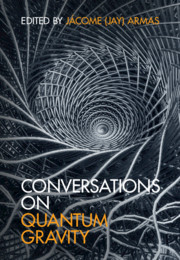9 results
10 - Laurent Freidel
-
- Book:
- Conversations on Quantum Gravity
- Published online:
- 05 August 2021
- Print publication:
- 26 August 2021, pp 210-225
-
- Chapter
- Export citation
8 - Bianca Dittrich
-
- Book:
- Conversations on Quantum Gravity
- Published online:
- 05 August 2021
- Print publication:
- 26 August 2021, pp 177-192
-
- Chapter
- Export citation
24 - Carlo Rovelli
-
- Book:
- Conversations on Quantum Gravity
- Published online:
- 05 August 2021
- Print publication:
- 26 August 2021, pp 463-480
-
- Chapter
- Export citation
32 - Thomas Thiemann
-
- Book:
- Conversations on Quantum Gravity
- Published online:
- 05 August 2021
- Print publication:
- 26 August 2021, pp 614-635
-
- Chapter
- Export citation
3 - Abhay Ashtekar
-
- Book:
- Conversations on Quantum Gravity
- Published online:
- 05 August 2021
- Print publication:
- 26 August 2021, pp 62-100
-
- Chapter
- Export citation
28 - Lee Smolin
-
- Book:
- Conversations on Quantum Gravity
- Published online:
- 05 August 2021
- Print publication:
- 26 August 2021, pp 531-560
-
- Chapter
- Export citation

Conversations on Quantum Gravity
-
- Published online:
- 05 August 2021
- Print publication:
- 26 August 2021
3 - Emergence of Time in Loop Quantum Gravity
- from Part I - Spacetime Emergence
-
-
- Book:
- Beyond Spacetime
- Published online:
- 24 April 2020
- Print publication:
- 14 May 2020, pp 53-78
-
- Chapter
- Export citation
6 - Space and Time in Loop Quantum Gravity
- from Part II - Time in Quantum Theories of Gravity
-
-
- Book:
- Beyond Spacetime
- Published online:
- 24 April 2020
- Print publication:
- 14 May 2020, pp 117-132
-
- Chapter
- Export citation

